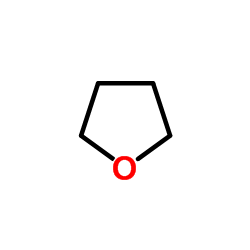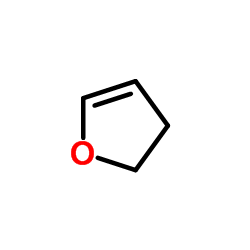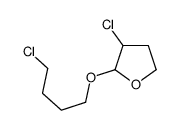3511-19-1
| 中文名 | 2,3-二氯四氢呋喃 |
|---|---|
| 英文名 | 2,3-dichlorooxolane |
| 中文别名 |
四氢-2,3-二氯呋喃
二氯四氢呋喃 |
| 英文别名 |
FURAN,2,3-DICHLOROTETRAHYDRO
Tetrahydro-2,3-dichlorofuran MFCD08443596 2,3,6-TRIFLUOROBENZOPHENONE 2,3-bis(chloranyl)oxolane 2,3-Dichlor-tetrahydro-furan 2,3-dichloro-tetrahydro-furan 2,3-dichlorotetrahydrofurane EINECS 222-513-0 opt.inaktiv. 2,3-Dichlor-tetrahydrofuran |
| 密度 | 1,34 g/cm3 |
|---|---|
| 沸点 | 63 °C / 20mmHg |
| 分子式 | C4H6Cl2O |
| 分子量 | 140.99600 |
| 闪点 | 132.7ºC |
| 精确质量 | 139.98000 |
| PSA | 9.23000 |
| LogP | 1.57900 |
| 外观性状 | 液体;Colorless to Light orange to Yellow clear liquid |
| 折射率 | 1.472 |
| 储存条件 | 常温,避光,通风干燥处,密封保存 |
| 稳定性 | 常温常压下稳定 |
| 分子结构 | 1、 摩尔折射率:29.88 2、 摩尔体积(m3/mol):106.5 3、 等张比容(90.2K):254.6 4、 表面张力(dyne/cm):32.5 5、 极化率(10 -24cm 3):11.84 |
| 计算化学 | 1.疏水参数计算参考值(XlogP):1.6 2.氢键供体数量:0 3.氢键受体数量:1 4.可旋转化学键数量:0 5.互变异构体数量:无 6.拓扑分子极性表面积9.2 7.重原子数量:7 8.表面电荷:0 9.复杂度:66.7 10.同位素原子数量:0 11.确定原子立构中心数量:0 12.不确定原子立构中心数量:2 13.确定化学键立构中心数量:0 14.不确定化学键立构中心数量:0 15.共价键单元数量:1 |
| 更多 | 1. 性状:未确定 2. 密度(g/mL,25/4℃):1.34 3. 相对蒸汽密度(g/mL,空气=1):未确定 4. 熔点(ºC):未确定 5. 沸点(ºC,常压):未确定 6. 沸点(ºC,5.2kPa):63 7. 折射率:未确定 8. 闪点(ºC):未确定 9. 比旋光度(º):未确定 10. 自燃点或引燃温度(ºC):不适用的 11. 蒸气压(kPa,25ºC):未确定 12. 饱和蒸气压(kPa,60ºC):未确定 13. 燃烧热(KJ/mol):未确定 14. 临界温度(ºC):未确定 15. 临界压力(KPa):未确定 16. 油水(辛醇/水)分配系数的对数值:未确定 17. 爆炸上限(%,V/V):未确定 18. 爆炸下限(%,V/V):未确定 19. 溶解性:未确定 |
|
Section I.Chemical Product and Company Identification Chemical Name 2,3-Dichlorotetrahydrofuran Portland OR SynonymTetrahydro-2,3-dichlorofuran Chemical FormulaC4H6Cl2O CAS Number3511-19-1 Section II.Composition and Information on Ingredients Chemical NameCAS Number Percent (%)TLV/PELToxicology Data 2,3-Dichlorotetrahydrofuran3511-19-1Min. 95.0 Not available.Not available. (GC) Section III. Hazards Identification Acute Health EffectsNo specific information is available in our data base regarding the toxic effects of this material for humans. However, exposure to any chemical should be kept to a minimum. Skin and eye contact may result in irritation. May be harmful if inhaled or ingested. Always follow safe industrial hygiene practices and wear proper protective equipment when handling this compound. CARCINOGENIC EFFECTS : Not available. Chronic Health Effects MUTAGENIC EFFECTS : Not available. TERATOGENIC EFFECTS : Not available. DEVELOPMENTAL TOXICITY: Not available. There is no known effect from chronic exposure to this product. Repeated or prolonged exposure to this compound is not known to aggravate existing medical conditions. Section IV.First Aid Measures Eye ContactCheck for and remove any contact lenses. IMMEDIATELY flush eyes with runing water for at least 15 minutes. keeping eyelids open. COLD water may be used. DO NOT use an eye oitment. Flush eyes with running water for a minimum of 15 minutes, occasionally lifting the upper eyelids. Seek medical attention. Treat symptomatically and supportively. Skin ContactAfter contact with skin, wash immediately with plenty of water. Gently and thorough wash the contaminated skin with running water and non-abrasive soap. Be particularly careful to clean folds, crevices, creases and groin. COLD water may be used. Cover the irritated skin with an emollient. Seek medical attention. Treat symptomatically and supportively. Wash any contaminated clothing before reusing. InhalationIf the victim is not breathing, perform artificial respiration. Loosen tight clothing such as a collar, tie, belt or waistband. If breathing is difficult, oxygen can be administered. Seek medical attention. Treat symptomatically and supportively. INDUCE VOMITING by sticking finger in throat. Lower the head so that the vomit will not reenter the mouth and throat. Ingestion Loosen tight clothing such as a collar, tie, belt, or waistband. If the victim is not breathing, administer artificial respiration. Examine the lips and mouth to ascertain whether the tissues are damaged, a possible indication that the toxic material was ingested; the absence of such signs, however, is not conclusive. Seek immediate medical attention and, if possible, show the chemical label. Treat symptomatically and supportively. Section V.Fire and Explosion Data Not available. FlammabilityMay be combustible at high temperature.Auto-Ignition Flammable Limits Flash PointsNot available. Not available. Combustion ProductsThese products are toxic carbon oxides (CO, CO 2), halogenated compounds. WARNING: Highly toxic HCl gas is produced during combustion. Fire Hazards No specific information is available regarding the flammability of this compound in the presence of various materials. Explosion HazardsRisks of explosion of the product in presence of mechanical impact: Not available. Risks of explosion of the product in presence of static discharge: Not available. No additional information is available regarding the risks of explosion. Fire Fighting Media SMALL FIRE: Use DRY chemicals, CO 2, water spray or foam. and InstructionsLARGE FIRE: Use water spray, fog or foam. DO NOT use water jet. Continued on Next Page 2,3-Dichlorotetrahydrofuran Section VI.Accidental Release Measures Spill CleanupIn case of a spill and/or a leak, always shut off any sources of ignition, ventilate the area, and exercise caution. Absorb Instructionswith an inert material and put the spilled material in an appropriate waste disposal. Finish cleaning the spill by rinsing any contaminated surfaces with copious amounts of water. Consult federal, state, and/or local authorities for assistance on disposal. Section VII. Handling and Storage Handling and StorageKeep away from heat and sources of ignition. Mechanical exhaust required. When not in use, tightly seal the container and store in a dry, cool place. Avoid excessive heat and light. Do not breathe gas, fumes, vapor or spray. Information Always store away from incompatible compounds such as oxidizing agents. Section VIII. Exposure Controls/Personal Protection Engineering ControlsProvide exhaust ventilation or other engineering controls to keep the airborne concentrations of vapors below their respective threshold limit value. Ensure that eyewash station and safety shower is proximal to the work-station location. Personal ProtectionSplash goggles. Lab coat. Vapor and dust respirator. Gloves. Suggested protective clothing might not be sufficient; consult a specialist BEFORE handling this product. Exposure LimitsNot available. Section IX. Physical and Chemical Properties Solubility Physical state @ 20°CLiquid.Not available. 1.34 Specific Gravity Molecular Weight141Partition CoefficientNot available. Boiling Point93°C @ 70mm HgVapor PressureNot available. Melting PointNot available.Vapor DensityNot available. Not available.VolatilityNot available. Refractive Index Critical TemperatureNot available.OdorNot available. ViscosityNot available.TasteNot available. Section X.Stability and Reactivity Data Stability This material is stable if stored under proper conditions. (See Section VII for instructions) Conditions of InstabilityAvoid excessive heat and light. Incompatibilities Reactive with oxidizing agents. Section XI. Toxicological Information RTECS NumberLU0525000 Eye contact. Ingestion. Inhalation. Routes of Exposure Toxicity DataNot available. Chronic Toxic EffectsCARCINOGENIC EFFECTS : Not available. MUTAGENIC EFFECTS : Not available. TERATOGENIC EFFECTS : Not available. DEVELOPMENTAL TOXICITY: Not available. There is no known effect from chronic exposure to this product. Repeated or prolonged exposure to this compound is not known to aggravate existing medical conditions. Acute Toxic EffectsNo specific information is available in our data base regarding the toxic effects of this material for humans. However, exposure to any chemical should be kept to a minimum. Skin and eye contact may result in irritation. May be harmful if inhaled or ingested. Always follow safe industrial hygiene practices and wear proper protective equipment when handling this compound. Continued on Next Page 2,3-Dichlorotetrahydrofuran Section XII.Ecological Information EcotoxicityNot available. Not available. Environmental Fate Section XIII. Disposal Considerations Recycle to process, if possible. Consult your local or regional authorities. You may be able to dissolve or mix material with Waste Disposal a combustible solvent and burn in a chemical incinerator equipped with an afterburner and scrubber system. Observe all federal, state, and local regulations when disposing of the substance. Section XIV. Transport Information DOT ClassificationNot a DOT controlled material (United States). Not applicable. PIN Number Proper Shipping Name Not applicable. Packing Group (PG)Not applicable. DOT Pictograms Section XV. Other Regulatory Information and Pictograms TSCA Chemical InventoryThis product is NOT on the EPA Toxic Substances Control Act (TSCA) inventory. The following notices are required by 40 CFR 720.36 (C) for those products not on the inventory list: (EPA) (i) These products are supplied solely for use in research and development by or under the supervision of a technically qualified individual as defined in 40 CFR 720.0 et sec. (ii) The health risks of these products have not been fully determined. Any information that is or becomes available will be supplied on an MSDS sheet. WHMIS ClassificationNot controlled under WHMIS (Canada). (Canada) EINECS Number (EEC) Not available. EEC Risk StatementsNot available. SECTION 16 - ADDITIONAL INFORMATION N/A |
|
毒理学数据: 致肿瘤数据: 小鼠皮下TDLo:888 mg/kg/74W-I 生态学数据: 通常对水是不危害的,若无政府许可,勿将材料排入周围环境 CHEMICAL IDENTIFICATION
HEALTH HAZARD DATAACUTE TOXICITY DATA
|
| 风险声明 (欧洲) | R36/37/38:Irritating to eyes, respiratory system and skin . |
|---|---|
| 安全声明 (欧洲) | S26-S36/37/39 |
| RTECS号 | LU0525000 |
| 海关编码 | 2932190090 |
|
~% 
3511-19-1 |
| 文献:Justus Liebigs Annalen der Chemie, , vol. 596, p. 1,86, 113 Comptes Rendus Hebdomadaires des Seances de l'Academie des Sciences, , vol. 226, p. 185 Journal of the Chemical Society, , p. 1707,1712 |
|
~% 
3511-19-1 |
| 文献:Journal of the Chemical Society, , p. 136,141 |
|
~% 
3511-19-1 |
| 文献:Comptes Rendus Hebdomadaires des Seances de l'Academie des Sciences, , vol. 226, p. 185 Justus Liebigs Annalen der Chemie, , vol. 596, p. 1,86,113 DE703956 , ; DRP/DRBP Org.Chem. |
| 海关编码 | 2932190090 |
|---|---|
| 中文概述 | 2932190090 其他结构上有非稠合呋喃环化合物. 增值税率:17.0% 退税率:9.0% 监管条件:无 最惠国关税:6.5% 普通关税:20.0% |
| 申报要素 | 品名, 成分含量, 用途 |
| Summary | 2932190090 other compounds containing an unfused furan ring (whether or not hydrogenated) in the structure VAT:17.0% Tax rebate rate:9.0% Supervision conditions:none MFN tariff:6.5% General tariff:20.0% |





